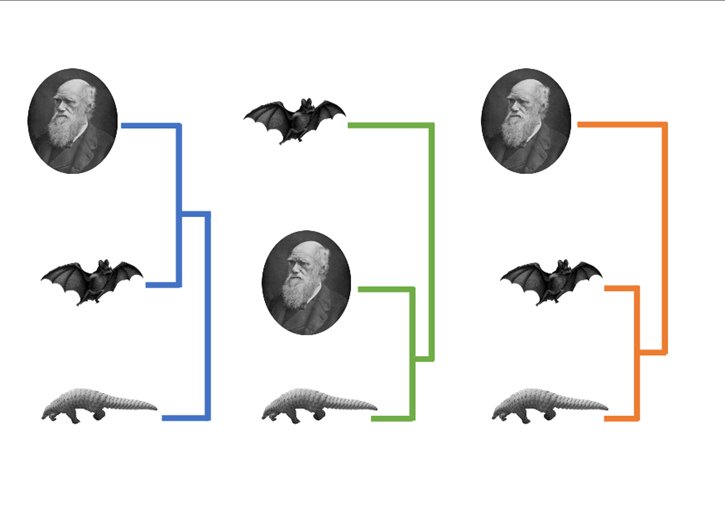
The XXI Morning colloquium on the evolution will be held on May 16, 2020, through an online platform and will be focused on the COVID-19 pandemic. Registration from April 29 to May 12
16 May 2020
PROGRAM
09:00-09:15 Welcome
09:15-10:00 Xavier López-Labrador: New coronavirus: those who warn you don't want you sick
Since the 80s we have received warnings that a large-scale pandemic could paralyze our modern globalized world: the AIDS virus gave a first warning, in 2002 a new coronavirus, (SARS-CoV), in 2009 a new influenza A virus (H1N1pdm09), in 2012 another new coronavirus (MEROS-CoV)... At the end of 2019, SARS-CoV-2 starts the current pandemic in Wuhan. We will see how experience with influenza A and the SARS and MEROS coronaviruses have helped to quickly develop diagnostic and screening methods and will help in the development of vaccines against the new coronavirus.
Xavier López-Labrador, Senior Researcher of the National Health System, did the thesis on diagnosis, genotyping, and genetic variation of the hepatitis virus and studied viral immunology during a postdoctoral stay at Stanford Medical School. Since 2004 he has been doing research at FISABIO-Salud Pública (The Foundation for the Promotion of Health and Biomedical Research of Valencia Region.) Associate Professor of Microbiology at the University of Valencia, the main research of his group focuses on the pathogenic mechanisms, the determinants of protective immunity and the epidemiology of the hepatitis virus and respiratory viruses.
10:15-11:00 Mireia Coscollá: The SARS-CoV-2 genomes
If the SARS-Cov-2 that jumped the species barrier a few months ago is exactly the same one that is now infecting everyone, it may be a near philosophical question. What we do know is that its genome is not the same, nor is it the same in all people and places. Knowing the SARS-Cov-2 is knowing all these genomes, which can tell us its origin, its history, how the epidemic advances or recedes, and can help us in the future to evaluate treatments and vaccines once we have them.
Mireia Coscollá is a biologist and researcher for the Ramón y Cajal program. She currently leads the PatoGenOmica research group at I2SysBio (UV-CSIC). She has always studied pathogens from an evolutionary point of view, from the hepatitis C virus, to Legionella pnemophila during her doctorate, to the bacteria that causes tuberculosis at the Institute of Public and Tropical Health in Switzerland where she researched for seven years.
11:15-12:00 David Alonso: Mathematics and the dynamics of infectious diseases
Mathematics gives us tools to describe, precisely and quantitatively, how infectious diseases spread within a population. We will discuss what is meant by dynamics and the limitations and advantages of encapsulating the dynamics of the spread of an infectious disease in a mathematical model.
David Alonso is a physicist and biologist. He is currently a Scientific Researcher at the CSIC. He holds a PhD in the complex systems group from Ricard Solé and has made postdoctoral stays in several research centres and universities in America and Europe. In 2011 he joined the Centre for Advanced Studies in Blanes (CSIC), where he promoted the Theoretical and Computational Ecology group (http://www.theelab.net/).
12:15-13:00 Carolina Moreno: Hares run in the sea during the coronavirus pandemic: lies, myths and rumors about COVID-19
Since the beginning of the COVID-19 pandemic, sociologists and communicators around the world have agreed that this is the first time that the concept of infodemics has become a reality. The models that had been worked with were based on health (dis)information circulating on social media before the pandemic, with indicators to identify when information is from a dubious source. Information epidemics are caused by the dissemination and spread of toxic information that can put people's health at risk.
Carolina Moreno is a professor of journalism and researcher at The Research Institute on Social Welfare Policy (POLIBIENESTAR) in the UV. She coordinates the research group ScienceFlows, which studies the images that are constructed from the media and social media about science and technology, as well as the social perception and understanding of science.
13:00-13:45 Final debate. Chair: Juli Peretó
With the support of:
Delegation of the Principal for UV Incorporation Planning, Lifelong Learning Service and Educational Innovation (UV), Scientific Culture of Innovation Unit (UV), Spanish Foundation for Science and Technology (FECYT), Ministry of Science and Innovation, Cavanilles Institute of Biodiversity and Evolutionary Biology (UV), Institute for Integrative Systems Biology I2SysBio (UV-CSIC), Faculty of Biological Sciences (UV), Jardín Botánico (UV), UV Publications, Mètode Journal (UV), Catalan Society of Biology and Institute of Catalan Studies.
You can register HERE.
You can download the program HERE.
Once you have registered, you will receive instructions via e-mail to connect to the session on 16 May 2020.








